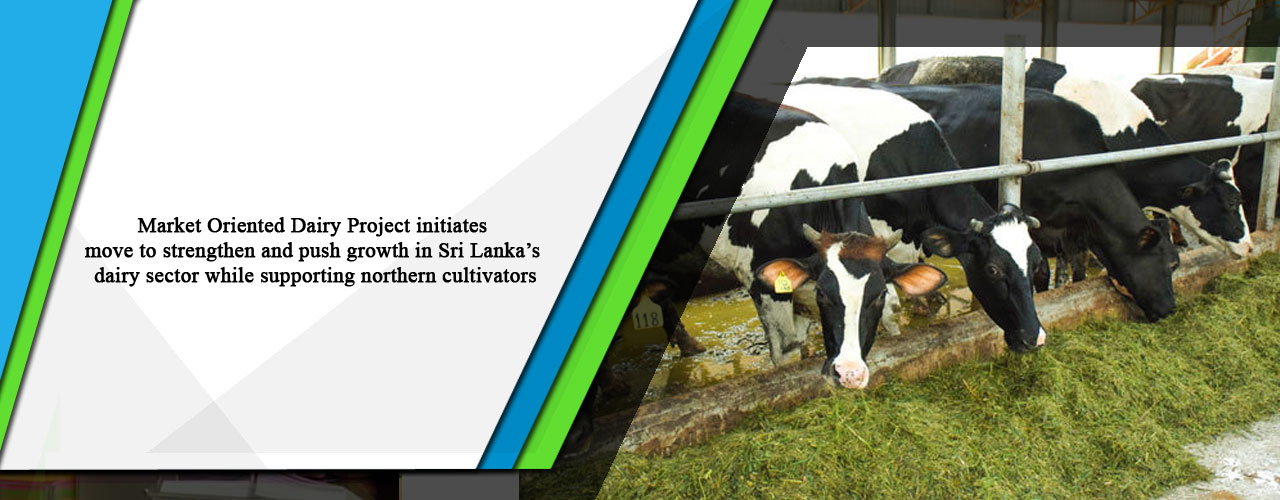Market Oriented Dairy Project initiates move to strengthen and push growth in Sri Lanka’s dairy sector while supporting northern cultivators
The Market-Oriented Dairy (MOD) Project has reportedly announced the signing of a buyer-seller agreement between Lanka Forages Pvt Ltd and fodder cultivators in the northern region recently with its primary objective of strengthening and pushing the growth of Sri Lanka’s dairy sector.
Considered the first of its kind in the northern region, the project will facilitate several other such agreements between fodder buyers and cultivators around the island, a local media report stated.
The main purpose is to ensure year-round availability of good quality fodder and silage at a competitive price, which is essential for dairy farmers to maintain a healthy, high-yield dairy herd and year-round milk production, a media release by the Market Oriented Dairy Project has stated.
The Government of Sri Lanka aims to achieve self-sufficiency in milk production by 2022 and dairy is the most important sub-sector in the Sri Lankan livestock industry, the report noted.
Yet the country currently meets only about 40 per cent of fresh milk demand locally and therefore enhancing dairy farmer productivity and overall dairy sector competitiveness is critical in fulfilling the national agenda, the report also noted.
“To increase milk yield and assure year-round milking for dairy farmers, feed is identified as the most indispensable and basic input with fodder being a major component. Presently, very few farmers grow quality pasture and fodder to feed their animals, instead depending mostly on natural grasses growing on road sides and uncultivated public and private lands, which is highly inadequate in meeting the nutritional needs of dairy cows. Only a very small percentage of dairy farmers adopt fodder conservation methods such as making silage for better yields. This limited availability of quality pasture and fodder, shortage of land in some areas for grass cultivation and managed cultivation, lack of knowledge on usage of silage, together with the seasonal variations in supply, creates a significant bottleneck in dairy production impacting all types of farms, such as small and large-scale farms including mega farms. Further, the scarcity of feed increases the feed costs for dairy farmers,” the release has stated.
Market Oriented Dairy Project Director, Matthew Krause has stated that, “the interventions are designed in a holistic manner by (a) educating farmers on the need for quality feed year-round to increase yield and (b) creating awareness amongst stakeholders on the business opportunities around growing, conserving and selling fodder to potential cultivators to assure year-round supply of feed.”
Krause has further noted, “Essentially we encourage both the dairy farmers and the fodder cultivators to think as entrepreneurs by providing training, enhancing technical knowledge on latest techniques and quality planting material and methodologies which are adaptable to local conditions as well as business planning.”
Lionel Dharmasiri, Managing Director, Lanka Forages Pvt Ltd, has been quoted as saying that “this is a unique business model for Sri Lanka. The agreement fulfills a great need for the country to be able to supply fodder and silage at a competitive price. The other signatories and I sensed the growing market opportunity and have the confidence that there is a guaranteed market for commercial fodder cultivation assured with an agreed rate and time period.”
OSL take:
The move by the Market Oriented Dairy Project while providing a livelihood for cultivators in the northern region of Sri Lanka is also aimed at strengthening the country’s dairy sector. Such initiatives provide excellent business opportunities as well. The increased productivity and the strengthening of the manufacturing line would result in a constant supply of dairy milk. Given Sri Lanka’s need to develop the country’s dairy industry and become self sustained in fresh milk, foreign businesses could explore the business opportunities in Sri Lanka’s dairy sector as it is a constantly growing sector.
| Article Code : | VBS/AT/20181227/Z_5 |

